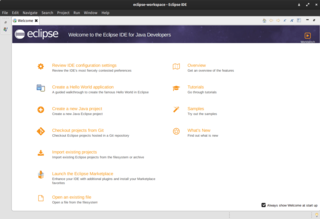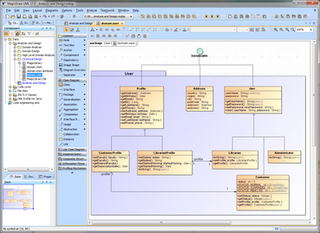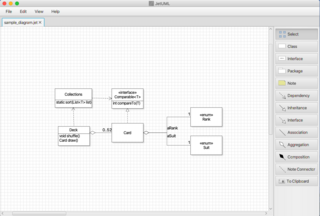
ArgoUML is an UML diagramming application written in Java and released under the open source Eclipse Public License. By virtue of being a Java application, it is available on any platform supported by Java SE.

The unified modeling language (UML) is a general-purpose visual modeling language that is intended to provide a standard way to visualize the design of a system.
This is a "genealogy" of programming languages. Languages are categorized under the ancestor language with the strongest influence. Those ancestor languages are listed in alphabetic order. Any such categorization has a large arbitrary element, since programming languages often incorporate major ideas from multiple sources.
The XML Metadata Interchange (XMI) is an Object Management Group (OMG) standard for exchanging metadata information via Extensible Markup Language (XML).

Eclipse is an integrated development environment (IDE) used in computer programming. It contains a base workspace and an extensible plug-in system for customizing the environment. It is the second-most-popular IDE for Java development, and, until 2016, was the most popular. Eclipse is written mostly in Java and its primary use is for developing Java applications, but it may also be used to develop applications in other programming languages via plug-ins, including Ada, ABAP, C, C++, C#, Clojure, COBOL, D, Erlang, Fortran, Groovy, Haskell, JavaScript, Julia, Lasso, Lua, NATURAL, Perl, PHP, Prolog, Python, R, Ruby, Rust, Scala, and Scheme. It can also be used to develop documents with LaTeX and packages for the software Mathematica. Development environments include the Eclipse Java development tools (JDT) for Java and Scala, Eclipse CDT for C/C++, and Eclipse PDT for PHP, among others.
A UML tool is a software application that supports some or all of the notation and semantics associated with the Unified Modeling Language (UML), which is the industry standard general-purpose modeling language for software engineering.

StarUML is a software engineering tool for system modeling using the Unified Modeling Language, as well as Systems Modeling Language, and classical modeling notations. It is published by MKLabs and is available on Windows, Linux and MacOS.
UMLet is an open-source Java-based UML tool designed for teaching the Unified Modeling Language and for quickly creating UML diagrams. It is a drawing tool rather than a modelling tool as there is no underlying dictionary or directory of reusable design objects. UMLet is distributed under the GNU General Public License.
In Microsoft Windows applications programming, OLE Automation is an inter-process communication mechanism created by Microsoft. It is based on a subset of Component Object Model (COM) that was intended for use by scripting languages – originally Visual Basic – but now is used by several languages on Windows. All automation objects are required to implement the IDispatch interface. It provides an infrastructure whereby applications called automation controllers can access and manipulate shared automation objects that are exported by other applications. It supersedes Dynamic Data Exchange (DDE), an older mechanism for applications to control one another. As with DDE, in OLE Automation the automation controller is the "client" and the application exporting the automation objects is the "server".

MagicDraw is a proprietary visual UML, SysML, BPMN, and UPDM modeling tool with team collaboration support.

yEd is a general-purpose diagramming program with a multi-document interface.

UModel is a UML software modeling tool from Altova, the creator of XMLSpy. UModel supports all 14 UML 2 diagram types and adds a unique diagram for modeling XML Schemas in UML. UModel also supports SysML for embedded system developers, and business process modeling for enterprise analysts. UModel includes code engineering functionality including code generation in Java, C#, and Visual Basic, reverse engineering of existing applications, and round-trip engineering.

Moose is a free and open source platform for software and data analysis built in Pharo.

ConceptDraw DIAGRAM is proprietary diagramming software used to create business graphics, including: diagrams, flowcharts, Infographics, data visualization for business process models, data presentation and project management documentation. It can also be used for creating professional and technical diagrams, such as: UML diagrams, DFD, ERD, computer networks topology, engineering schemes, floor plans, and other technical graphic formats. The program was developed by CS Odessa in 1999. Since 2008, it has formed a part of ConceptDraw OFFICE. A set of solution add-ons that include collections of task-oriented templates and vector stencils libraries, have been released for ConceptDraw DIAGRAM, relating to certain industry-specific graphical tasks. The software also contains a set of tools for vector graphics drawing, along with a built-in presentation mode.

Sparx Systems Enterprise Architect is a visual modeling and design tool based on the OMG UML. The platform supports: the design and construction of software systems; modeling business processes; and modeling industry based domains. It is used by businesses and organizations to not only model the architecture of their systems, but to process the implementation of these models across the full application development life-cycle.
Skipper is a visualization tool and code/schema generator for PHP ORM frameworks like Doctrine2, Doctrine, Propel, and CakePHP, which are used to create database abstraction layer. Skipper is developed by Czech company Inventic, s.r.o. based in Brno, and was known as ORM Designer prior to rebranding in 2014.

Art of Illusion is a free software, and open source software package for making 3D graphics.

JetUML is a UML tool developed as a pure-Java desktop application for educational and professional use. The project was launched in January 2015 with a focus on minimalist design. The name JetUML relates to the primary goal of the tool, namely the quick sketching of diagrams in the Unified Modeling Language (UML). JetUML is a free and open-source software licensed under the GNU General Public License (GPL).











